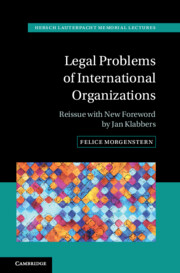433 results
Foreword
-
-
- Book:
- Legal Problems of International Organizations
- Published online:
- 15 February 2024
- Print publication:
- 22 February 2024, pp vii-xxvi
-
- Chapter
- Export citation
2 - Participation in International Organizations: Representation and Representativity
-
- Book:
- Legal Problems of International Organizations
- Published online:
- 15 February 2024
- Print publication:
- 22 February 2024, pp 48-94
-
- Chapter
- Export citation
Preface
-
- Book:
- Legal Problems of International Organizations
- Published online:
- 15 February 2024
- Print publication:
- 22 February 2024, pp xxvii-xxviii
-
- Chapter
- Export citation
Copyright page
-
- Book:
- Legal Problems of International Organizations
- Published online:
- 15 February 2024
- Print publication:
- 22 February 2024, pp iv-iv
-
- Chapter
- Export citation
Contents
-
- Book:
- Legal Problems of International Organizations
- Published online:
- 15 February 2024
- Print publication:
- 22 February 2024, pp v-vi
-
- Chapter
- Export citation
1 - The Legal Environment
-
- Book:
- Legal Problems of International Organizations
- Published online:
- 15 February 2024
- Print publication:
- 22 February 2024, pp 3-47
-
- Chapter
-
- You have access
- HTML
- Export citation
3 - The Establishment of Standards of Conduct by International Organizations
-
- Book:
- Legal Problems of International Organizations
- Published online:
- 15 February 2024
- Print publication:
- 22 February 2024, pp 95-139
-
- Chapter
- Export citation
Introduction
-
- Book:
- Legal Problems of International Organizations
- Published online:
- 15 February 2024
- Print publication:
- 22 February 2024, pp 1-2
-
- Chapter
- Export citation
Index
-
- Book:
- Legal Problems of International Organizations
- Published online:
- 15 February 2024
- Print publication:
- 22 February 2024, pp 143-152
-
- Chapter
- Export citation
Abbreviations
-
- Book:
- Legal Problems of International Organizations
- Published online:
- 15 February 2024
- Print publication:
- 22 February 2024, pp xxix-xxx
-
- Chapter
- Export citation
Abbreviations of Organizations
-
- Book:
- Legal Problems of International Organizations
- Published online:
- 15 February 2024
- Print publication:
- 22 February 2024, pp xxxi-xxxii
-
- Chapter
- Export citation
Conclusion
-
- Book:
- Legal Problems of International Organizations
- Published online:
- 15 February 2024
- Print publication:
- 22 February 2024, pp 140-142
-
- Chapter
- Export citation
Table of Cases
-
- Book:
- Legal Problems of International Organizations
- Published online:
- 15 February 2024
- Print publication:
- 22 February 2024, pp xxxiii-xxxiv
-
- Chapter
- Export citation

Legal Problems of International Organizations
- Reissue with New Foreword by Jan Klabbers
-
- Published online:
- 15 February 2024
- Print publication:
- 22 February 2024
16 - Domestic Courts and Their Relationship with International Law
- from Part III - The Surroundings of International Law
-
- Book:
- International Law
- Published online:
- 19 October 2023
- Print publication:
- 02 November 2023, pp 317-334
-
- Chapter
- Export citation
Index
-
- Book:
- International Law
- Published online:
- 19 October 2023
- Print publication:
- 02 November 2023, pp 351-374
-
- Chapter
- Export citation
8 - International Courts and Tribunals
- from Part I - The Structure of International Law
-
- Book:
- International Law
- Published online:
- 19 October 2023
- Print publication:
- 02 November 2023, pp 153-179
-
- Chapter
- Export citation
Abbreviations
-
- Book:
- International Law
- Published online:
- 19 October 2023
- Print publication:
- 02 November 2023, pp xxxv-xxxviii
-
- Chapter
- Export citation
Part II - The Substance of International Law
-
- Book:
- International Law
- Published online:
- 19 October 2023
- Print publication:
- 02 November 2023, pp 199-314
-
- Chapter
- Export citation
Table of Cases
-
- Book:
- International Law
- Published online:
- 19 October 2023
- Print publication:
- 02 November 2023, pp xxii-xxxiv
-
- Chapter
- Export citation



